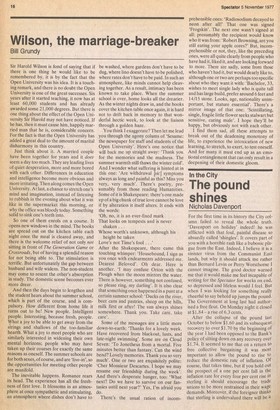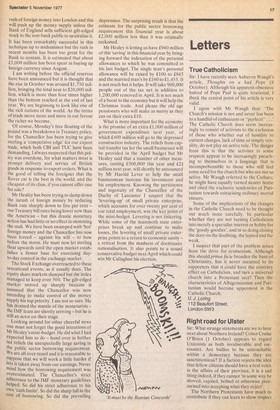In the City
The pound shines
Nicholas Davenport
For the first time in its history the City column failed to reveal the whole truth. 'Davenport on holiday' indeed! he was afflicted with that foul, painful disease so absurdly called 'shingles'. It covers part of YOU with a horrible rash like a bubonic plague from the East. Indeed, I believe it is a sinister virus from the Communist East lands, but why it should attack me rather than Bernard Levin or Perry Worsthorne cannot imagine. The good doctor warned me that it would make me feel incapable of writing for the Spectator for weeks on end, so depressed and lifeless would I feel. But when I was looking for something really cheerful to say behold up jumps the pound. The Government at long last had authorised a free float. On Monday night it closed at $1.84— a rise of 6.3 cents.
After the collapse of the pound last October to below $1.60 and its subsequent recovery to over $1.70 by the beginning of the year I had been opposed to the Bank's policy of sitting down on any recovery over $1.74. It seemed to me that on a return to free collective bargaining it was most important to allow the pound to rise to reduce the domestic rate of inflation. Of course, that takes time, but if you hold out the prospect of a one per cent fall in the inflation rate for every four per cent rise in sterling it should encourage the trade unions to be more restrained in their wage demands. Moreover, if the foreigner thinks that sterling is undervalued there will be a rush of foreign money into London and this will push up the money supply unless the Bank of England sells sufficient gilt-edged stock to the non-bank public to neutralise it.
It has been remarkably successful in this technique up to midsummer but the rush in recent months has been too great for the Bank to contain. It is estimated that about £3,000 million has been spent in buying up foreign currency since August.
I am writing before the official reserves have been announced but it is thought that the rise in October was around $1,750 million, bringing the total near to $20,000 million, which is more than four times higher than the bottom reached at the end of last year. We are beginning to look like one of the rich nations of the world. As the terms of trade move more and more in our favour the richer we become.
Of course, Monday's free floating of the pound was a breakdown in Treasury policy, for the Chancellor has been trying to give sterling a 'competitive edge' for our export trade, which both CBI and TUC have been demanding. I always suspected that this policy was overdone, for what matters most is prompt delivery and service of British goods in response to export orders. What is the good of telling the foreigner that the Rover car is the best in the world, and the cheapest of its class, if you cannot offer one for sale?
Mr Healey has been trying to damp down the inrush of foreign money by reducing Bank rate sharply down to five per cent — our Treasury bill rates being lower now than the American — but this drastic monetary action has had little or no effect in stemming the rush. We have been swamped with 'hot' foreign money and the Chancellor has now been forced — against his will — to bow before the storm. He must now let sterling float upwards until the open market establishes a firmer base for exercising dayto-day control in the exchange market.
, The Stock Exchange overreacted to these sensational events, as it usually does. The equity share markets slumped but the index managed to keep over 500. The gilt-edged market moved up sharply because it assumed that the Chancellor was now intending to make control of the money supply his top priority. I am not so sure.lHe has donned the mantle of the monetarists — the IMF team are shortly arriving — but he is Still an actor on their stage.
Looking around for other cheerful news one must not forget the good intentions of Mr Healey's mini-budget. He did what I had expected him to do — hand over in further tax reliefs the unexpectedly large saving in the public sector borrowing requirement. We are all over-taxed and it is reasonable to suppose that we will work a little harder if less is taken away from our earnings. Never mind how the borrowing requirement was overestimated. The Chancellor's strict adherence to the IMF monetary guidelines helped. So did his strict adherence to his own 'cash limits'. So did the sharp fall in the cost of borrowing. So did the prevailing depression. The surprising result is that the estimate, for the public sector borrowing requirement this financial year is about £2,000 million less than it was originally reckoned.
Mr Healey is letting us have £940 million of this 'saving' in this financial year by bringing forward the indexation of the personal allowances to which he was committed in his last budget. The single man's personal allowance will be raised by £100 to £945 and the married man's by £160 to £1,455. It is not much but it helps. It will take 900,000 people out of the tax net in addition to 1,200,000 removed in April. It is not much of a boost to the economy but it will help the Christmas trade. And please the old age pensioners who will make as merry as they can on their extra £10.
What is more important for the economy is the promise of an extra £1,000 million of government expenditure next year, of which £400 million will go to the depressed construction industry. The reliefs from capital transfer tax for the small businesses will be provided in the April budget but Mr Healey said that a number of other measures, costing £500,000 this year and £2i million next year, will shortly be announced by Mr Harold Lever to help the small businessman increase his investment and his employment. Knowing the persistence and ingenuity of the Chancellor of the Duchy of Lancaster I suspect that the 'levering-up' of small private enterprise, which accounts for over twenty per cent of our total employment, was the key point of the mini-budget. Levering is not tinkering. While some of the mammoth state enterprises break up and continue to make losses, the levering of small private enterprise points to a return to economic sanity — a retreat from the madness of doctrinaire nationalisation. It also points to a sound conservative budget next April which could win Mr Callaghan his election.



































 Previous page
Previous page